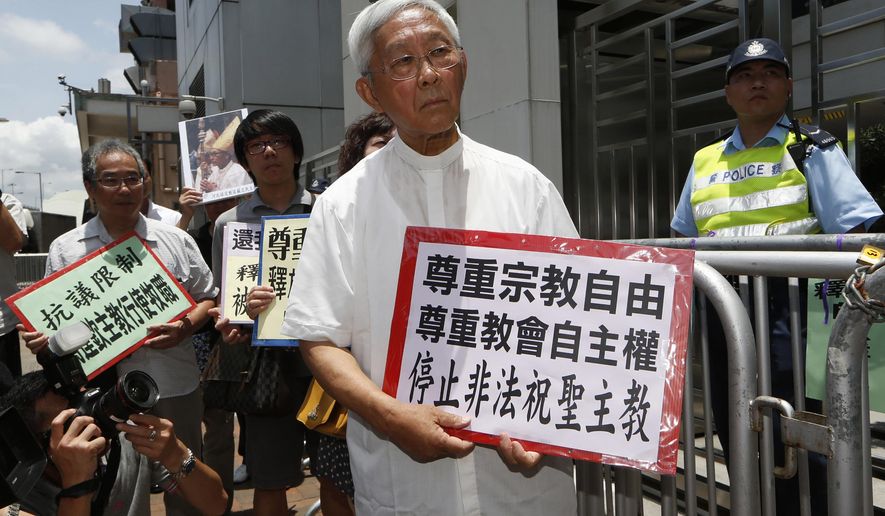Religious freedom is not only under growing threat around the globe from China and other totalitarian regimes, dignitaries warned at a summit this week in Washington, but it also faces challenges from leftists in stalwart democracies such as Japan to curb faith groups since last year’s assassination of former Prime Minister Shinzo Abe.
The assassination’s aftermath has emboldened fringe Japanese communists to try to smear and discredit Abe’s long-ruling Liberal Democratic Party over its links to the Unification Church, said former House Speaker Newt Gingrich, who warned this week that Tokyo now finds itself in a “political fight about an ideology of communism, which wants to destroy its major competitor” to “get control of Japan.”
“This is a huge problem,” Mr. Gingrich told an audience at the International Religious Freedom Summit 2023, referring to the pressure campaign in Japan against members of the Unification Church. Unification Church officials and members say they have faced death threats and other forms of harassment in the wake of Abe’s death.
“This is a political fight with huge ramifications for communist China, and it’s very dangerous,” said the Georgia Republican, who served in the House throughout the 1980s and 1990s and remains an influential force within Republican and other conservative circles.
He gave his sobering warning in a speech before dignitaries gathered at a dinner Tuesday night at the IRF summit. The event has featured remarks from a wide range of international and U.S. religious and political leaders, including from the Biden administration.
Several have called on the world to recognize the threat posed to religious freedom by autocratic, authoritarian, communist and even hard-line theocratic regimes in countries such as Iran, North Korea and China.
Mr. Gingrich’s message regarding the persecution of the Unification Church dovetailed with broader remarks by Sam Brownback, a former U.S. ambassador-at-large for international religious freedom. Mr. Brownback co-chaired this year’s summit.
Abe’s assassin reportedly had a personal grievance with the church and targeted the former prime minister because he participated in events organized by the church.
That has given Unification Church critics in Japan an opening to target the government of conservative Prime Minister Fumio Kishida, spotlighting what they say are close ties between the government and the church. Church officials say they are cooperating in the Abe investigation and have addressed questions about fundraising, adoption and other practices highlighted by critics.
“When a government can take out one church, it can take out every church, every religious institution, and so you never really want to let it get started in the first place,” said Mr. Brownback, who spoke alongside Mr. Gingrich at the dinner, which was sponsored by The Washington Times Foundation and the Universal Peace Federation.
“It’s about a common human right and about preventing a government from stomping on it — even a democracy as well-formed and with as strong a constitution as Japan has,” said Mr. Brownback, a former Kansas governor who also served in the Senate.
Political fallout
The fallout from the Abe assassination in July has been politically tense in Japan. Left-leaning media outlets and the generally centrist-conservative LDP’s communist party enemies launched a campaign against the party over its reported ties to the Unification Church, also known as the Family Federation for World Peace and Unification.
Mr. Kishida has denied that the church has ever influenced his party’s policymaking, but he has responded to the pressure campaign by strengthening internal controls on ties between LDP members and the Unification Church.
Japan’s parliament enacted a law in December to restrict donation solicitations to politicians by religious and other groups. The law has triggered warnings from faith freedom groups around the world, among them the International Religious Freedom Roundtable, which has representatives in dozens of countries.
The law prohibits religious groups from engaging in “spiritual sales” of items said to carry religious significance and allows believers, other donors and their families to seek the return of money given to religious organizations.
Members of the Unification Church say the church has not engaged in spiritual sales for more than a decade, and critics of the Japanese law say it has unjustly targeted the church in response to a Communist Party-fueled public relations campaign about the Unification Church’s alleged political clout.
Others say the Japanese Diet has entered risky territory by trying to curtail religious activities in general.
“Clearly, the new legislation, inquiry and guidelines have the Unification Church squarely in their sights,” Financial Times Asia Business Editor Leo Lewis wrote in an opinion article in early January.
“However well-intentioned the project, the risk has always been that in its rush to enact something, Japan has skipped some extraordinarily nuanced theological questions and created potential trouble for a much larger circle of organizations and activities than it has bargained for,” he wrote. “If these troubles come to include, however obliquely, Japan’s mainstay religions of Shinto and Buddhism, and even the substantial Christian presence here, the political backlash could be more severe than the one it was meant to head off.”
Mr. Gingrich warned this week that Tokyo risks violating “every principle on which the Japanese Constitution was written.”
“This is a real-time, current fight. This isn’t some abstract theory,” he said.
“It’s a fight which, in the end, I think religious liberty will win, but it will only win when the political leadership in Japan decides that it’s too expensive to fight against it,” Mr. Gingrich said.
“There is a very significant effort by many people to get the Japanese political leadership to understand that the road they’re on is extraordinarily dangerous,” he said. The Unification Church and its associated movement have been targeted because they have “been so effective in stopping communism.”
• Mark A. Kellner can be reached at mkellner@washingtontimes.com.
• Guy Taylor can be reached at gtaylor@washingtontimes.com.




Please read our comment policy before commenting.